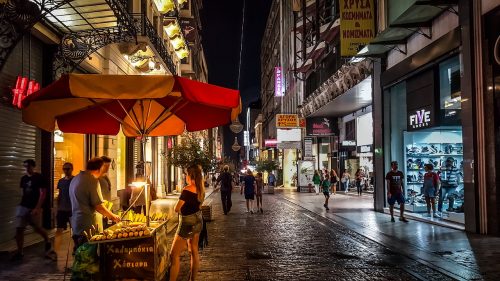
With summer vacation upon us, many people are traveling around and taking the chance that school being out affords them and their families to see some of the most famous places in the world. Cultural icons such as the Taj Mahal, the pyramids of Giza, the castles of Europe in the United Kingdom or along the Seine or Loire rivers. Destinations of yesteryear still remain popular — Rome, Athens, Paris. However, if you’re planning to travel overseas, you need to make some plans if you’re going to be taking your phone or your electronics since the rest of the world does not use the same kind of plugs or voltage as North America does. Also, you might want to be careful with how adventurous you are when it comes to eating the local cuisine to avoid having your vacation be another cautionary tale in when (and where) not to drink the water. However, that’s what we’re hear to help you with to ensure that this summer’s vacation travels are full of fun instead of frustration!
1) Invest in a plug adapter
The rest of the world uses a diverse range of plugs for their wall sockets. If you’re relying on your location to have American-style sockets, you may be very disappointed. Instead, you’ll need to get adapters that will plug into wall where ever you’re going. In this, you’ll need to do a bit of research to see what shape plug to get — a French plug won’t necessarily work in the UK and neither will work in Russia! However, this adapter is not a voltage convertor.
2) Get a voltage converter
A voltage converter will allow you to use your electronics — laptop, hairdryer, flat iron, gadget chargers, and more. If you try to use your electronics overseas without a voltage convertor, at best, they just won’t work as well or at all. At worst? Well, fire, melting, smoking, and burning them out is a distinct possibility.
3) Don’t Forget to Pack Antacids and Toothpaste!
Many foreign countries do not put fluoride in their water. Some do not always have toothpaste with fluoride in it. If you’re going to be traveling overseas for a month or more, you will want to make certain you can either find toothpaste with fluoride in it or that you’ve carried some with you. Also, carrying some antacids from home can be very helpful. In Europe, many times pharmacies (or chemists’ shops in the UK) are closed on Sunday and picking up things like antacids or aspirin may be tricky.
4) Try a few “common” foreign dishes while at home
True, you may not have all of the ingredients and the same spices that you’ll find overseas but you should be able to gather enough of the required materials to get a sense of whether or not a particular dish is going to be to your liking or if it might send you running for the privy. Also, take some time to research what kind of carry-out or fast food you can generally find overseas. While yes, you can almost always find an American-themed restaurant, it’s better to know that you can grab a panini just a few blocks from the Luxembourg Gardens in Paris and have a nice picnic by the Fountain de Medicis next to the Senat instead of wondering where the nearest McDonalds is.
5) Remember what they say about American beer
American beer is something of a joke in Europe. European beer (especially German or Russian) is much stronger. So, if you’re planning to go down to the local pub and enjoy a few rounds, keep in mind that you may not be able to pound down as many over there as you can over here.
Traveling overseas is a great way to broaden your horizons — especially if you don’t just stick to the tourist traps and instead range around a good bit. However, you do want to be prepared so that your gadgets and your GI tract don’t fizzle out on you a few days after you step off the plane!
Leave a Reply